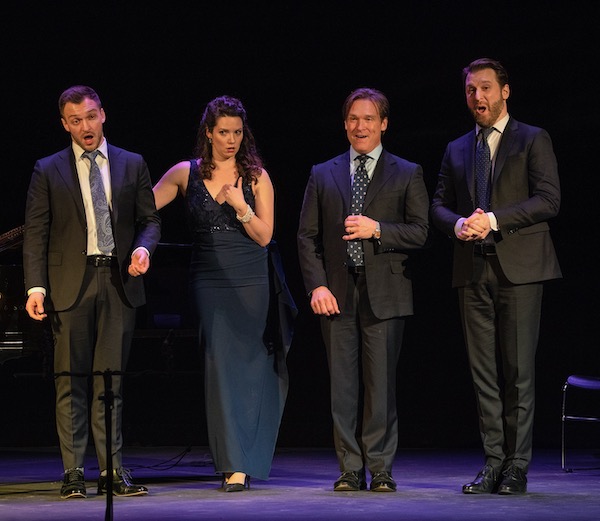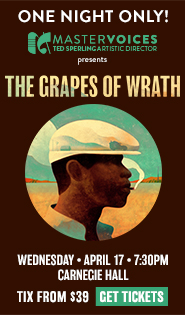Mirror Visions Ensemble puts its stamp on letter songs at Sheen Center

Mirror Visions Ensemble brought its attractive brand of text-focused song performance back to the Sheen Center’s Loreto Theater Monday night with a program titled “The Disappearing Art of Letter Writing,” designed around the world premiere of What Shall I Say?, a charming new song cycle by Tom Cipullo.
Obituaries for letter writing may be premature, as it seems more people are writing to each other now than ever before. But whatever its future potential, the current style of two-thumbs communication would not be mistaken for the leisurely thought and social niceties people used to cultivate with the aid of books such as What Shall I Say? A Guide to Letter Writing for Ladies by the advice columnist “Mrs. Humphry,” published in London in 1898.
Mrs. Humphry’s sage advice (“Black ink is always good form. Avoid violet!”) and sample letters (to a neighbor: “Could you, please, without too much inconvenience move the piano away…from our common wall?”) provided rich fodder for Cipullo’s six songs, stylishly interpreted by soprano Mireille Asselin, the only “lady” onstage Monday night amid three male vocalists and a pianist.
It fell to Asselin to introduce each of the program’s six sections with a Cipullo song, followed by tenors Scott Murphree and Daniel McGrew, baritone Jesse Blumberg, and herself taking mostly solo turns in material ranging from Romantic lieder to Broadway, with the program’s “curator” Grant Wenaus discreetly accompanying at the piano.
Vocal styles in the intimate theater emphasized forward voice placement, clear diction, and conversational rhythms over operatic power, although the latter was available if needed. Asselin in particular had to pour on the drama occasionally, but also distinguished herself in subtler shades of mood from melancholy to vivacious to barely suppressed rage in Mozart’s wicked “Als Luise die Briefe ihres ungetreuen Liebhabers verbrannte” (As Luise burned her unfaithful lover’s letters).
The three male singers offered a variety of timbres, from Blumberg’s clear, open baritone to Murphree’s dark tenor bordering on baritone and McGrew’s higher and more lyrical, Irish-style tenor. Each proved adept at shifting expressive gears, as when the three took turns singing Christopher Berg’s tiny, witty settings of the poet Mallarmé’s calling-card quatrains to his friends in Les loisirs de la poste.
The piano was propped open slightly on its short stick, providing a handy place for a singer to rest an arm, and also signaling the piano’s subordinate role. Although his light-fingered approach might be criticized in a more traditional lieder recital, Wenaus proved an expert weaver of moods with just a few notes (or a lot), and managed to be quite present without calling attention to himself—except for the piano-moving song mentioned above, which Cipullo drolly fitted with an accompaniment of really bad practicing, repeated spastic scales that would drive any neighbor up the “common wall.”
Flipping through the song texts—letters, or poems about letters–before the performance, one was struck by their inherent richness of allusion, eloquence, and depth of feeling. What could the composers, however talented, add to them? There is a reason some of history’s greatest lieder were composed to pretty bad Herzen-Schmerzen poetry.
Not every composition Monday night notably enhanced its text, but there were some standouts.
Cipullo deftly set Mrs. Humphry’s somewhat surreal advice and sample letters in light and dark tones that, in Asselin’s aware performance, evoked the pain and social anxiety behind the polite phrases.
In the evening’s other world premiere, Richard Pearson Thomas’s “To Coulanges,” all four singers tumbled over each other to babble the breathless gossip of Madame de Sévigné, a letter-writing aristocrat in 1670, to hilarious effect.
In Lincoln Letters, composer Berg drew a stark contrast between Lincoln’s bantering pre-inauguration notes to his supporters and a wartime “Meditation on the Divine Will,” found among his papers after his death and sung Monday by McGrew and Blumberg in sober sixths over a soft march beat in the piano.
And mention must be made of soprano Asselin’s powerfully focused performance, ranging from near-recitative to bursts of lyricism, in John Kander’s setting of Civil War soldier Sullivan Ballou’s famous, heartbreaking letter to his wife in contemplation of his imminent death, surely the most eloquent and unimprovable text to emerge from that conflict.
Happily, the program closed with lighter fare, with the two tenors singing and acting their way though “You Made Me Love You” by Joe McCarthy and James V. Monaco and two humorous fan songs attached to it, Roger Edens’s “Dear Mr. Gable” and Mike Craver’s “Dear Mr. Gershwin.”
Thomas’s zesty “To Coulanges” followed, and the vocal quartet wrapped things up with Cole Porter’s ironic thanks-for-nothing note for a boring weekend in the country, “Thank you so much, Mrs. Lowsborough-Goodby.” Sadly, the song is lower-drawer Porter, short on wit and long on mean-spiritedness, and not even a vigorous performance by all hands could elevate it.
Culture Project presents About Love, a play with songs and music based on a story by Turgenev, running Feb. 25 through March 22 at Sheen Center. sheencenter.org; 212-925-2812,


